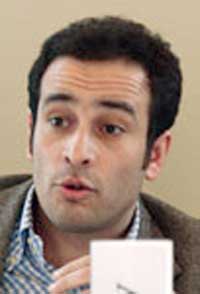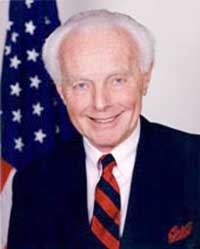|
US Tilts Towards Accepting Islamists Political Role
 |
|
Rice
is seen as the champion of the new policy-shift on US-Islamist
dialogue.
|
By
Shady Hassan, IOL Correspondent
WASHINGTON,
April 26, 2005 (IslamOnline.net) - A chorus of voices demanding the
Bush administration to listen and talk with popular Islamists in Arab
and Muslim countries has reached a crescendo with senior officials
recognizing the faulty policy of giving the cold shoulder to a more
representative current.
Media
reports have suggested that the US Commission on International
Religious Freedom (USCIRF) will seek to meet with leaders of the
outlawed Muslim Brotherhood during its upcoming visit to Egypt.
The
commission advises the US president, Congress and the State Department
on international religious freedom worldwide.
US
Secretary of State Condoleezza Rice is seen as the champion of the new
policy-shift on US-Islamist dialogue.
Western
diplomatic sources in the Egyptian capital recently told the
London-bazed Arabic-speaking Al-Sharq Al-Awsat daily that the US State
Department has drawn up a memo calling for direct and permanent
political dialogue with the Muslim Brotherhood.
It
recommended inviting the group’s representatives to the US for
better communication and common grounds on Egypt’s reform policies
and the pressing issues in the region.
The
European Union called on Saturday, April 16, for a dialogue with the
“more representative” Islamist opposition groups in the Middle
East to encourage a transition to democracy.
Illusions
Rice
has recently recognized that Washington’s Mideast policy was faulty.
“We
had a bigger problem, which was that for 60 years or so, the United
States has been associated with a policy of exceptionalism vis-à-vis
the Middle East where it came to issues of democracy,” she said.
“We
talked about democracy every place else in the world -- Africa, Asia,
Latin America, Europe -- but not in the Middle East, because there we
talked about stability.
“…What
we learned was we were not getting stability and we were not getting
democracy; we were getting a malignancy that caused people to fly
airplanes into buildings on September 11,” Rice recently said.
President
George W. Bush had signaled a change of heart.
“The
advance of hope in the Middle East requires new thinking in the
region,” he said in a recent interview.
“By
now it should be clear that authoritarian rule is not the wave of the
future. It is the last gasp of a discredited past.”
Emerging
Islamists
 |
|
“The
realization of the new moderate Islamist vision requires a degree
of openness on the part of the Egyptian government,” said
Hamzawy.
|
|
The
issue of possible US-Islamist dialogue has recently made its way to
the US Congress.
Arab
pundits and thinkers, invited to a Congressional hearing presided over
by Henry Hyde, Chairman of the House International Relations
Committee, saw in emerging Islamist rule in a number of countries a
role models for the region.
“…Prominent
role being played by moderate Islamists in Turkey and Iran suggests
that movements based on some form of Islamic legitimacy may be vital
to effect a transition to stable and consensual governance in Muslim
countries,” said Abdelwahab El-Affandi, a senior research fellow at
the Centre for the Study of Democracy, University of Westminster,
London.
“These
democratizing experiments have huge implications for the Arab world,
where internal models for such a transition are so far lacking,” he
added.
The
expert maintained that “political space for Islamists in the Arab
world is severely restricted, hindering the ability to press for
reform.”
Kada
Akacem, professor of economics at the University of Algiers, picked
the Algerian example to make a point in his argument.
“Moderate
Islamist movements are now a permanent part of the Algerian political
landscape,” he told the hearing.
“The
so-called eradicators who dream of permanently excluding all Islamists
from politics must recognize that such movements are one of the best
guarantees of social and political stability because they resonate
powerfully with Algeria's rapidly growing young population,” he
added.
The
expert contended that the Turkish model was the best case scenario
Algeria could adopt.
In
Turkey, he said, the military is the real guarantor of democracy, and
in which moderate Islamists are allowed to capture civilian power
through regular elections, as long as they accept the democratic rules
of the political game.
Mustapha
Kamel Al-Sayyid, a professor of political science and director of the
Center for the Study of Developing Countries at Cairo University, said
government's recognition of the Muslim Brotherhood as a legitimate
political party is the central issue in political reform.
“If
the regime persists in denying the Brotherhood legal status, not only
would any move towards reform lack credibility, but the stability of
the country itself could be jeopardized,” he warned.
Amr
Hamzawy, senior Associate at Carnegie Institute, said it is an
axiomatic fact that non-violent Islamist movements, like the Muslim
Brotherhood, are well rooted in a country like Egypt.
“The
realization of the new moderate Islamist vision requires a degree of
openness on the part of the Egyptian government towards their
integration into the political process,” he told the hearing.
Najib
Ghadhbian, Assistant Professor of Political Sciences at the University
of Arkansas, hailed the Islamists in Syria for their policy shift.
“The
Islamists of Syria have dropped extremist elements, endorsed the
demand for democratic rule and expressed firm support for minority and
women's rights,” he said.
Scarecrow
Saadeddin
Ibrahim, Professor of Social Sciences at the American University
in Cairo and Director of Ibn Khaldoun Center in Egypt, stressed that
Islamists were just a bugaboo used by the authoritarian Arab regimes
to head off reform pressures.
He
told the hearing that the Arab leaders keep warning the West that
reform and democracy might bring the Islamists to power and
consequently cause them a headache.
Arab
leaders managed for a while to get the US scale back its controversial
“Greater Middle East Initiative,” which preaches democracy in the
region after using the Islamist scarecrow.
Washington
has already re-named its reform plan to “The Broader Middle East and
North Africa.”
The
new proposal stressed that reform should come from within and should
not be imposed from outside.
It
also called for respecting the “characteristics and traditions” of
each country when it comes to political and social reform.
Wind
of Change
 |
|
Lantos
said that only Kuwait, Jordan, Morocco and Yemen can be rated as
free.
|
|
US
Congressmen at the hearing agreed on the need for change in the Middle
East.
“Faced
with three fundamental deficits in freedom, knowledge, and women's
rights, the current state of human development of the Arab people is a
contradiction of their historical contributions and achievements that
have been stepping stones to major advancements in Western
civilization,” said Hyde.
Rep.
Tom Lantos said that only four Arab countries, Kuwait, Jordan, Morocco
and Yemen, can be rated as free.
He
said, quoting a report by the Washington Institute, that the first
three managed to absorb the strong influential Islamists into the
political mainstream and they are working well within the outer
secular regime.
American
officials attending the closing session of the US-Islamic World Forum
in Doha on April 12 said the US is ready to “accept” the
involvement of Islamist groups like Palestinian Hamas and Lebanese
Hizbullah in the reform process should they understand “the rules of
the game”.
“They
firstly should put down arms and then take part in the democratic
process underway in their country,” Peter W. Singer of the
Washington-based Brookings Institution, told the session.
|